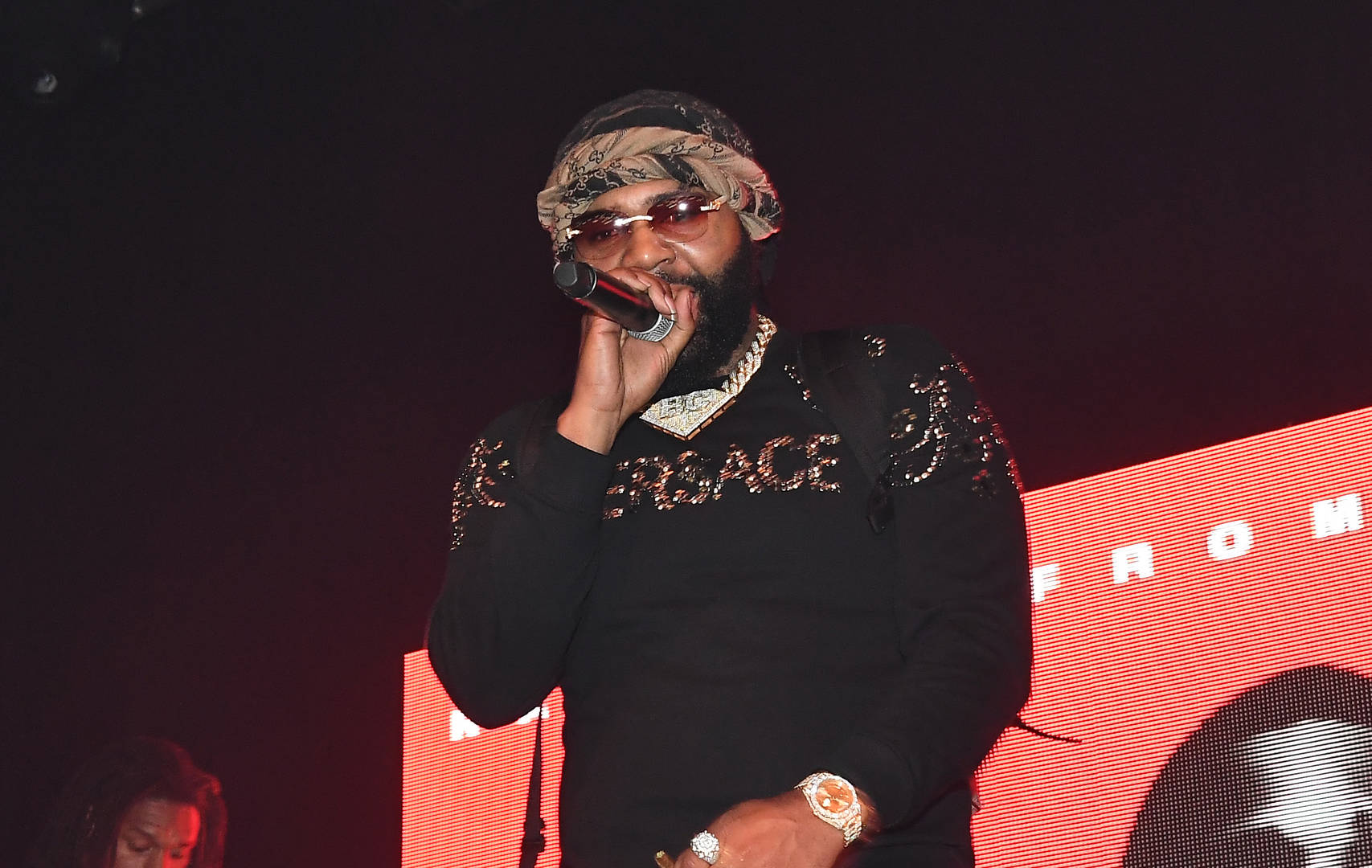Story
Who Is Money Man? Everything To Know About The “24” Rapper

With an already sizable discography, you’d think Money Man was a veteran of the rap scene. Turns out, the Georgia-raised rapper, born Tyson Jay Bolding, simply has ambitions beyond his years, condensing a career-long goal into a fraction of the time. He hit the ground running with the creation of Black Circle Family, his independent label named after his acclaimed 2016 debut album, Black Circle. His 2016 debut solo single, “Boss Up” and 2017’s “How It Feel” garnered public attention, as well as interest from Cash Money Records. In addition to some high-profile collaborations we’ll discuss, Money Man has also made a name for himself with his descriptions of pursuing financial success.
If you’re not yet familiar with the New York-born but Decatur-raised 34-year old rapper, read on.

Paras Griffin/Getty Images
Early Deal with Cash Money
The 34-year old rapper’s first encounter with big money occurred early on in his career. In 2017, he became Cash Money’s newest signee. He wasted no time after signing and dropped three consecutive mixtapes with the label in under six months, July 2017’s Secret Society, October’s Harvest Season, and January 2018’s Grow God. While he turned heads with these releases, it’s his swift departure from Cash Money that remained the most discussed aspect.Not only did Money Man opt to leave the widely-successful label, he paid a quarter of a million dollars to do so. Money Man has stated that the move was not made out of any ill will toward Cash Money, but out of a desire to own his work. As he told The Source, “I bought myself out that deal so I could get 100% of the profit. Really, I’m not a splurger like that. I could make $500,000 and whatever else comes in over that I’ll spend. Then when I get to another amount I save that, and whatever money I make that exceeds that particular amount I had previously set to save I use that extra as spending money. So I make sure I have a lot of money put up to the side. That way if I’m going to talk to Birdman and ask, “So how much to buy myself out my deal?” I can pay that right now. I won’t have to wait or negotiate anything. I can just put my money up because I made sure I saved accordingly.”
Cash Money, however, didn’t display an equally friendly attitude over the matter, as the label removed his work from both Spotify and Apple Music amid the dispute. Money Man addressed the conflict after his work returned to the streaming services, explaining, “It was a money discrepancy. I was making so much money that my label didn’t know about that they felt they needed a piece of this. I told them I didn’t feel like they deserved a piece. They disagreed. After that happened that’s when I cashed myself out.”
Return to Black Circle Family and Partnership with Empire
In a series of business maneuvers we might expect Kanye West to approve of, Money Man did the Herculean task of thriving while independent. After leaving Cash Money, Money Man went back to his label, Black Circle Family, where he could enjoy full ownership of his work. Only this time, he chose to partner for ten albums with distributor, EMPIRE, who has worked with the likes of Kendrick Lamar, Anderson .Paak, and Migos. It appears he may have had the right idea, because the risky move resulted in him climbing the Billboard Charts four times since May of 2019. One such instance that likely helped boost his profile and expand his fan base was his October 2019 collaborative album with Peewee Longway, Long Money.

Money Man, Ghazi (founder of EMPIRE), and PeeWee Longway at the BET Hip-Hop Awards Show 2019 – Paras Griffin/Getty Images
This collaboration teed up for what would be a fruitful creative season, as his March-released mixtape, Epidemic, would prove to be his highest-charting work thus far, peaking at #24 on the Billboard Charts. Epidemic served as Money Man’s 18th mixtape, and yet, it was this project that became the catalyst to Money Man’s mainstream success (the lesson being, hard work pays off). In particular, it was Money Man’s hypnotic, guitar-driven single, “24” that drove the masses to streaming him. The record was quickly remixed by Lil Baby in Epidemic‘s deluxe edition from August 2020, going on to rake in over 24 million streams on Spotify alone. Despite the number of projects that precede it, the deluxe edition of Epidemic is just the start for Money Man’s career. Following the viral power of “24,” it’s looking like “Amazon” will be next up. It’s another example of Money Man’s ear-worm flow and his penchant for eerie, string-driven beats.
Goals Beyond Rap
This serves as just the latest indication that Money Man is leagues ahead of his competition in making a successful brand out of himself. Whereas his peers often reach the summits of the rap game at the expense of others via public feuds, Money Man has expressed disdain for diss songs, as he says they pose a serious threat to the culture, given hip-hop’s fatal history of rap beef. Even his sparse social media accounts are not filled with grievances, but showcase his excitement for new releases and collaborations. The self-proclaimed “Grow God” has eschewed such means of publicity and has instead found fulfillment by staying on his toes, looking for red-hot investment opportunities, and seemingly paying heed to both his mental and physical wellness– apart from littering references to a healthy lifestyle through out his music, he’s also spoken on his penchant for fasting in the past. “I’ll do a three-day water fast or a two-day fruit fast. I just be fasting. It opens up my mind. When I dropped my 24 Hours, 6 Hours, 6 Hours 2, I might fast before that. It’s just something hits me and I go crazy in the booth,” Money Man told the Source.
As far as business opportunities go, Money Man has a one-track mind. He admitted to Pitchfork, “I look at rap as a doorway to becoming a billionaire. It attracts different types of people for me to do business with, find out new things.” In the same interview, he spoke on being an early investor in Bitcoin. He told Pitchfork he had thus far managed to make at least $100,000 through cryptocurrency investments alone. “I had Bitcoin back when it was at $300. I just had a hunch that it was gonna explode, and it went all the way up to $18,000 when I cashed them out,” he said.
Are you a fan of Money Man? Sound off in the comments and let us know.
Story
Kieran James Honors Memory with “Part of the Grind”

Singer-songwriter Kieran James delivers a devastating new single with “Part of the Grind,” a track to tackle the tangled emotions behind loss and memory. A love letter penned to a close friend who faced severe cognitive decline, the song’s emotional heft feels universal yet heartbreakingly personal.
Set to delicate instrumentation and achingly sung vocals, “Part of the Grind” is both a lament and an honoring, a means of remembering while addressing the unavoidable cost of time and illness. His voice floats, leaving room for silence and the long pauses that so often come with grief. But in that silence, there is warmth as well, a refusal to let memory be totally extinguished.
Resilience is also implied in the song’s title, a reminder that even in heartbreak, life goes on and holding the memory of someone stays with the rhythm of everyday living. it’s an anthem for anyone who has ever looked on witnessing decline, mixed sorrow with love.
In Kieran James’s “Part of the Grind,” we hear music as well as go behind it. He gives us room feel, to mourn, and to honor. In the process, he turns private pain into something achingly universal, a song for everyone who has either loved or lost.
Story
Esthy glows up with joy on new anthem “light it up”

In her latest song, “light it up,” singer-songwriter and producer Esthy from LA brings a vibrant and uplifting vibe that feels like sunshine in musical form. By mixing elements of playful country with polished pop sounds, she creates a track that’s all about having fun and enjoying life.
Esthy’s singing truly shines, showcasing a lively and confident style. There’s a playful tone in her voice that makes the lyrics feel friendly and inviting, encouraging you to set aside your worries and immerse yourself in the moment.
“light it up” radiates energy and is lively and bright, featuring catchy guitar riffs and upbeat rhythms that draw you in right away. If you enjoy artists like Anne-Marie or OneRepublic, you’ll love this song, and Esthy adds her unique flair, making it special and memorable.
Esthy has a talent for creating catchy melodies, and with this one, you’ll find yourself humming throughout your day. Esthy is here to spread joy, inspire energy, and make music that connects with you instantly. This track is designed to remind you of your true unstoppable nature, and Esthy lights it up.
CLICK HERE TO STREAM Esthy’s “lights it up” on Spotify.
CONNECT WITH Esthy | Instagram | TikTok |
-

 Artist Spotlight5 days ago
Artist Spotlight5 days agoGOODTWIN shares reflection with indie-pop single, “Soak It Up”
-

 Artist Spotlight3 days ago
Artist Spotlight3 days agoSAMSARA transforms quiet heartbreak into a modern rock journey on latest release “mrs. porter”
-

 Artist Spotlight3 days ago
Artist Spotlight3 days agoTom Woodward exposes the dark side of modern idol worship in latest release “PHONEY MESSIAH”
-

 Artist Spotlight3 days ago
Artist Spotlight3 days agoMORPHEUS VON DOBENHAUSEN lets go of the chaos, dancing steady soft and slow in latest release “GOODBYE CHAOS”
-

 Artist Spotlight3 days ago
Artist Spotlight3 days agoSavvie steps out with an anthem of power and perseverance on latest release “Incredible”
-

 Artist Spotlight3 days ago
Artist Spotlight3 days agoSkillMusicsa speaks in silence when love fades with latest release “How Could You”
-

 Artist Spotlight3 days ago
Artist Spotlight3 days agoMarcello Cordova turns loss into light on latest release “Jan 3rd (I Wish We Would Have Had More Time)”
-

 Artist Spotlight21 hours ago
Artist Spotlight21 hours agoPaul Hodes and The Blue Buddha Band hit the open road with soulful americana in latest release “The Heartland”

